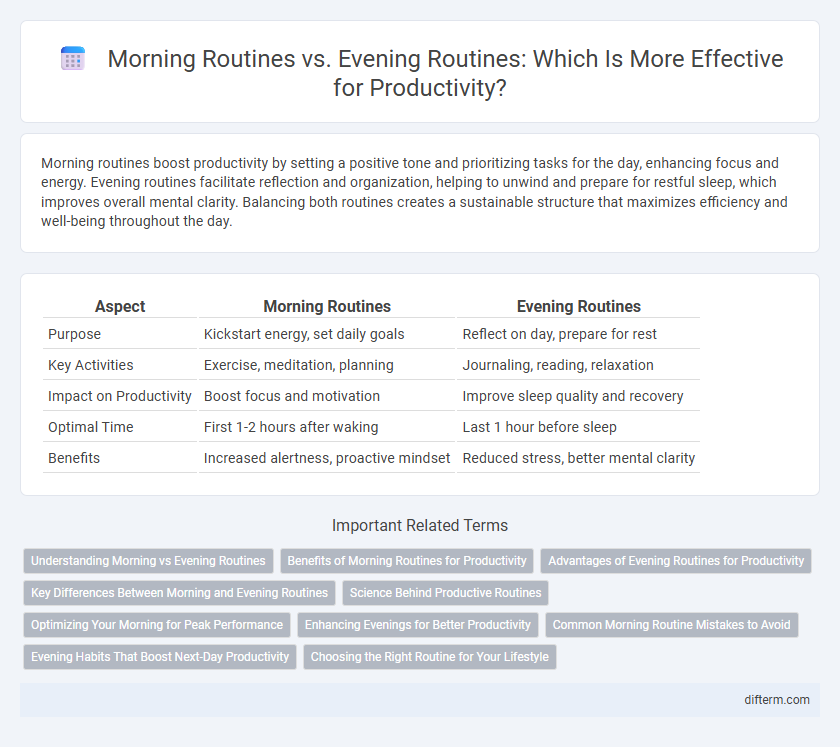Morning routines boost productivity by setting a positive tone and prioritizing tasks for the day, enhancing focus and energy. Evening routines facilitate reflection and organization, helping to unwind and prepare for restful sleep, which improves overall mental clarity. Balancing both routines creates a sustainable structure that maximizes efficiency and well-being throughout the day.
Table of Comparison
| Aspect | Morning Routines | Evening Routines |
|---|---|---|
| Purpose | Kickstart energy, set daily goals | Reflect on day, prepare for rest |
| Key Activities | Exercise, meditation, planning | Journaling, reading, relaxation |
| Impact on Productivity | Boost focus and motivation | Improve sleep quality and recovery |
| Optimal Time | First 1-2 hours after waking | Last 1 hour before sleep |
| Benefits | Increased alertness, proactive mindset | Reduced stress, better mental clarity |
Understanding Morning vs Evening Routines
Morning routines often enhance productivity by leveraging natural cortisol peaks to boost alertness and focus, while evening routines support relaxation and cognitive processing ahead of restorative sleep. Understanding the biological rhythms behind these routines helps optimize task scheduling, with demanding activities best suited for morning hours and reflective or creative tasks favored in the evening. Tailoring routines to individual chronotypes maximizes efficiency, combining morning vigor with evening calm to sustain productivity throughout the day.
Benefits of Morning Routines for Productivity
Morning routines enhance productivity by setting a focused tone for the day, boosting energy levels through exposure to natural light and physical activity. Establishing consistent morning habits like planning priorities and mindfulness exercises improves cognitive function, decision-making, and stress management. Research shows that morning routines correlate with increased goal achievement and sustained motivation throughout the workday.
Advantages of Evening Routines for Productivity
Evening routines enhance productivity by allowing individuals to review accomplishments, plan tasks for the next day, and reduce decision fatigue upon waking. Establishing a consistent wind-down routine improves sleep quality, leading to increased focus and energy during work hours. Prioritizing relaxation and organization in the evening supports sustained motivation and efficient task execution.
Key Differences Between Morning and Evening Routines
Morning routines often prioritize activities that boost alertness and set a productive tone, such as exercise, planning, and healthy breakfast habits. Evening routines emphasize winding down through activities like reflection, relaxation, and preparing for restful sleep to enhance recovery and focus for the next day. Key differences include the focus on energy activation in the morning versus energy conservation and mental decompression in the evening.
Science Behind Productive Routines
Scientific research reveals that morning routines align with the body's natural cortisol peak, enhancing alertness and cognitive function for improved productivity. Evening routines, conversely, support the wind-down of neural activity through the release of melatonin, which promotes restorative sleep essential for memory consolidation and focus. Both routines optimize productivity by leveraging circadian rhythms to regulate energy levels and mental clarity throughout the day.
Optimizing Your Morning for Peak Performance
Morning routines that include activities like exercise, meditation, and goal setting significantly enhance cognitive function and energy levels throughout the day. Implementing a structured morning schedule boosts focus, decision-making, and overall productivity by aligning circadian rhythms with high-priority tasks. Evening routines should prepare the body for restful sleep, ensuring mental clarity and peak performance during morning hours.
Enhancing Evenings for Better Productivity
Enhancing evening routines by incorporating activities like planning the next day, reflecting on accomplishments, and winding down with relaxation techniques can significantly boost productivity. Quality sleep, achieved through consistent sleep schedules and minimizing screen time before bed, improves cognitive function and energy levels for the following day. Prioritizing evening rituals such as journaling or light stretching fosters mental clarity and prepares the mind for a productive morning.
Common Morning Routine Mistakes to Avoid
Skipping breakfast and immediately diving into work disrupts energy levels and concentration throughout the day. Rushing through morning tasks without a structured plan can lead to increased stress and decreased productivity. Neglecting to limit screen time in the early hours reduces mental clarity and hampers focus on priority goals.
Evening Habits That Boost Next-Day Productivity
Establishing evening routines such as planning the next day, limiting screen time, and practicing relaxation techniques significantly enhances next-day productivity by improving sleep quality and mental clarity. Preparing tasks and setting priorities before bed reduces decision fatigue in the morning, allowing for a focused and efficient start. Incorporating habits like journaling or meditation in the evening further fosters a calm mindset, promoting sustained energy and motivation throughout the workday.
Choosing the Right Routine for Your Lifestyle
Morning routines boost cortisol levels and mental clarity, ideal for individuals with demanding daytime schedules seeking peak performance. Evening routines promote relaxation and improved sleep quality by reducing blue light exposure and encouraging mindfulness, benefiting those with evening productivity peaks or irregular work hours. Selecting the right routine depends on chronotype, work demands, and personal energy rhythms to maximize daily productivity and well-being.
Morning routines vs Evening routines Infographic

 difterm.com
difterm.com